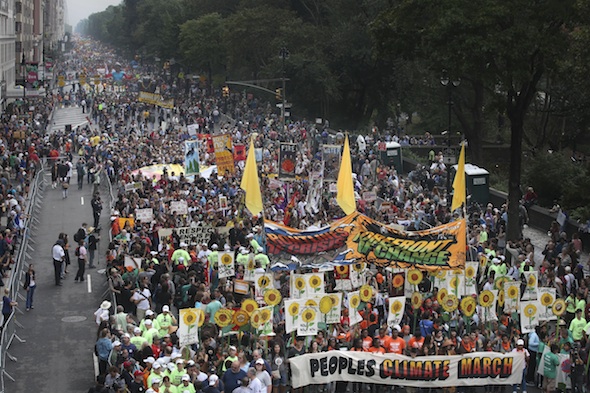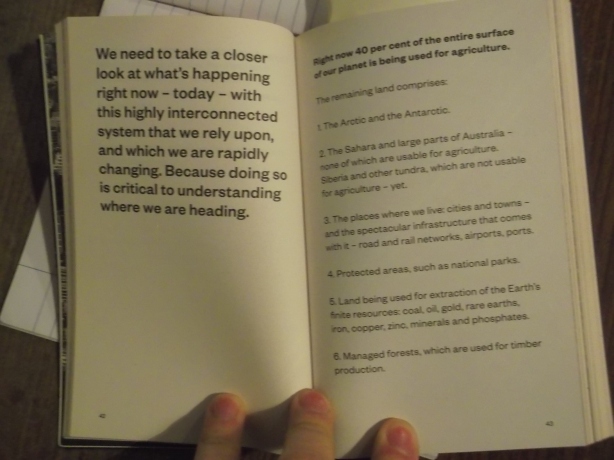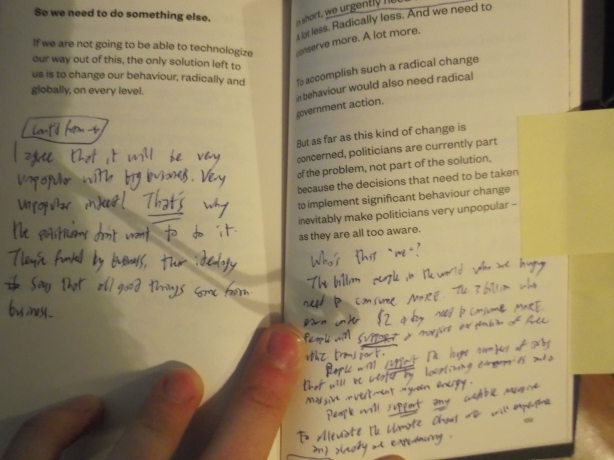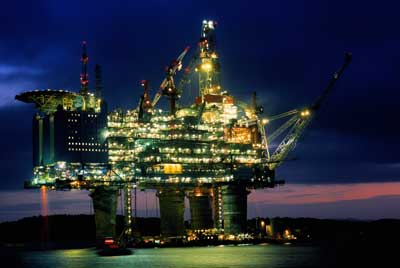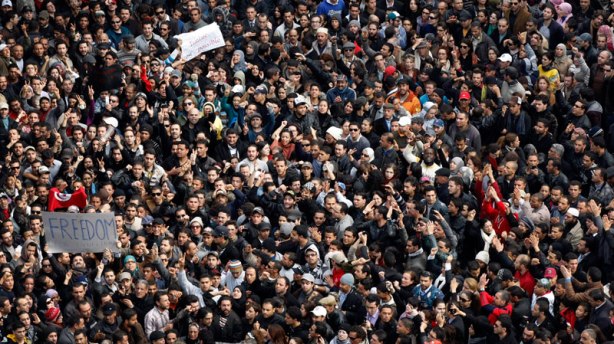With over 400,000 people hitting the streets of New York and marching for climate justice, with resistance to the Keystone XL pipeline, with Naomi Klein’s book This Changes Everything hitting the shelves, with this blogger finally getting a free Sunday morning away from the assembly line, it’s a good time me to write an article that I’ve wanted to write for some time, a furious review of a terrible book. It’s also the first long-ish article I’ve written in a long time, so put on the kettle, sit back and relax.
The book is 10 Billion by Stephen Emmott (Penguin 2013). It is basically a long essay that manages to take up a whole book by having a strange format that leaves a lot of blank space on each page. It also makes what Emmott is saying seem more vehement, clear and serious. Like this:
Another benefit of this strange format revealed itself to me as I read.
Though if you care to read it, the above page might seem innocent and informative, the book as a whole is absolutely infuriating. Emmott, a computational scientist who knows a lot about the climate and the economy, leads a lab at Cambridge, etc, has huge and astonishing blind spots. As I read on and on I found I couldn’t stand it; I couldn’t leave his stupid statements unanswered anymore, and I started reading it with a pen in my hand, scribbling furiously in the wide, empty spaces of the book. Like this:
First, the good points of the book. It contains a large amount of information that makes it abundantly clear how unsustainable human society is right now. Emmott doesn’t just talk about climate change or greenhouse gases, though he does deal with these in some detail. He talks about the unsustainability of land use, food production and water supplies, of a world economy in which hundreds of millions of shipping containers travel around the world zig-zagging between cheap labour and rich consumers, polluting the earth, the skies and the seas. It also contains powerful pictures, like this:
It looks like hell in some old painting, but it’s actually a burning tyre yard like the one in The Simpsons.
The negative aspect of the book, the one that makes it toxic, offensive and anti-human, is suggested by the title. Stephen Emmott believes that there are far too many people in the world. Far too many people, who consume too much land, energy, food and water. He sees absolutely no solution to the problems the Earth faces. The only advice he gives, on the last pages of the book (we are down to one or two sentences per page by now) is as follows: teach your children how to use firearms.
He has made it clear what he means by this: when society collapses and food riots erupt, your children will need to protect themselves from the seething, violent mass of humanity.
He makes it clear that in the book he is only addressing “rich people (like us)”. That is an actual quote. We get to page 185 of a 200-page book before Emmott lets us in on the fact that when he’s been talking about “us” and “we” for the entire book, he’s been talking not about the human race but about “the people who live in the north and west of the globe”. The rest, in his eyes, either don’t read, or don’t count.
An infuriating blind spot: his assumption that everyone in Europe and North America (not to mention Australia and New Zealand) is a “rich person” (like Stephen Emmott). The homeless, the unemployed, the working poor, the low and middle-income workers, in short, the majority of people in “the north and west of the globe” are walking evidence that Emmott in some very important ways doesn’t have a clue what he’s talking about.
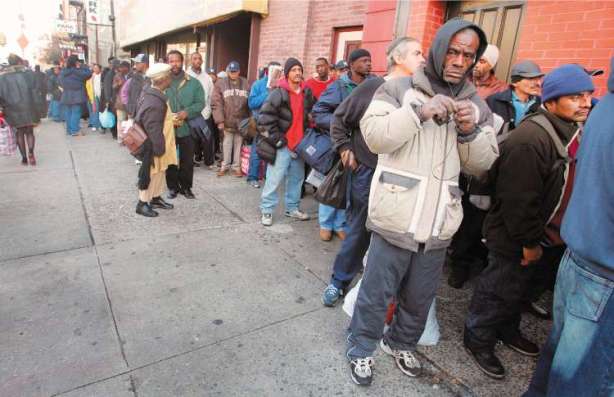
A welfare line in the USA: “Rich people” who live in “the north and west of the globe” who need to “radically” cut their consumption.
Blaming Humanity
He blames the sustainability crisis clearly and squarely on humanity itself: “our cleverness, our inventiveness and our activities are now the drivers of every global problem we face.” In actual fact, the problems he outlines throughout the book are very obviously problems created by private ownership of wealth, by corporations, by neo-liberal governments, not by humanity itself. He doesn’t mention such facts as the following: since the industrial revolution, just 90 companies have been responsible for two-thirds of human-made global warming emissions.
But far more criminally, he points out many facts that are just as interesting, that are just as much a condemnation of the capitalist system and of private corporations; and having pointed these facts out, he then draws the conclusion that humanity is to blame, that our “cleverness” and “ingenuity” are responsible.
Water Use
Let’s start with a small example from page 74. “It takes something like four litres of water to produce a one-litre plastic bottle of water. Last year, in the UK alone, we bought, drank and threw away nine billion plastic water bottles. That is 36 billion litres of water, used completely unnecessarily.”
How to save these 36 billion litres of water? First you have to grasp the absurdity of private companies selling us bottles of water in the first place. Next think about how we replaced plastic shopping bags with big, sturdy, re-usable shopping bags. Everyone should have a re-usable canteen of water, like the filter-headed Bobble bottles you can buy, which you can replenish at a clean public fountain on every street, or a free tap in every shop or bar or restaurant.
This is a small example of how re-orienting services along collectivist, socialised lines immediately cuts out waste. Of course, it also cuts out a huge slice of private profits for Volvic, Evian, etc. But what’s more important, private profits or maintaining access to water for the human race?
Never once in the book does Emmott consider the possibility of stepping on the toes of corporations, of getting in the way of private profits. Emmott contemplates the collapse of society, he imagines billions of people rioting as they starve to death. He imagines teaching his son how to kill others in order to stay alive. But never once does he even begin to contemplate socialising resources or nationalising industries to cut out waste and re-orientate to sustainable goals.
Let’s move on to a bigger example.
Greenhouse Gases
Emmott is rightly worried about the use of fossil fuels, which as we know contribute to global warming. He laments that Exxon Mobil has just signed a deal with the Russian government worth $500 million for oil and gas exploration in the Kara Sea. He says the British government has issued 197 licenses to drill for oil and gas in the North Sea. He quotes then UK energy minister John Hayes as saying that “The government is taking the right action to offer certainty and confidence to investors.”
Exxon Mobil and Putin sign a deal to wreck the environment for private profits; a British minister defends a similar move in the North Sea by saying that private corporations need to have “certainty” and “confidence” about their future profits. Corporations and ministers, driven by the private profit motive and the subservience of governments to the rich, all ignoring the scientific certainty that greenhouse gases will wreck the planet, all for a short-term increase in the wealth of a tiny number of people who are already far too rich. Has there ever been a clearer illustration of how capitalism is responsible for the destruction of the environment?
Emmott doesn’t think so. The connection never even seems to occur to him. He never once uses the word “capitalism” in the whole book. The fault, he makes clear many times, lies with us stupid, stupid humans.
3.5 billion under capitalism or 20 billion under socialism
Another massive problem is Emmott’s hang-up about the number of humans who live in the world. He has this really basic, stupid, doltish conception of things that crudely says that (1) more humans equals more consumption, and (2) more consumption equals more destruction.
But it’s obvious that this isn’t true. A community of a hundred people who are well-organised, cooperative and efficient will consume less than a community of fifty that is segregated into different economic units, that is inefficient, that duplicates labour and that does not re-use or recycle. The progress of human history has been in a large part the story of collective and social production methods overcoming petty, wasteful individual economic units.
I scribbled a note on page 117 that wasn’t intended to sound as alarming as it does: “The number of humans is secondary. How these humans are organised and relate to one another is primary. Even if we killed half the human race and enforced a draconian one-child policy, the destruction of the environment would continue if those 3.5 billion people were organised in a capitalist mode of production.”
And of course, on the other side of the same equation, even if there were 20 billion people on the planet, if they were organised in a reasonably harmonious, collective, efficient manner, with a maximum of democracy and a minimum of large-scale private wealth, these 20 billions could live in peace and relative prosperity.
(In such a society, of course, it would be unlikely that the population would reach 20 billion. Greater opportunities for economic advancement would lead to lower birth-rates.)
Emmott devotes some pages to casting about for a technological fix to these crises. He doesn’t entertain the possibility, not for one minute, that the problem is social and economic, and therefore that the solution must be social and economic.
Revolution
The food riots of 2010-2011 he simply describes as “violence and unrest”, more signs of the end times. The fact that this “violence and unrest” led to massive political revolutions is not of interest to Emmott. Our unsustainable economy is already pushing people onto the streets, sparking revolutions and uprisings. Those who took part in the march in New York were largely people from communities effected by climate change and pollution.
These billions of people, these multitudes of humanity, who Emmott sees as the problem, are in fact the solution. Faced with these massive ecological and economic problems, people are not just going to knuckle under and starve. They’re going to seek for an alternative, a democratic, ecological socialist society. Unless Emmott’s children shoot them first.
Tragedy of the commons?
Emmott claims that the destruction of the environment is a “tragedy of the commons”. Paraphrasing The Economist, he says that climate change “is a textbook case of the commons-despoiling tragedy.”
What he means by this is that the environment is like a field owned in common between a bunch of farmers. All of the farmers profit from the field but none wants to fork out money and time to maintain it, each hoping someone else does it. So the field degrades over time and in the end there’s no more field and no more profit.
Does this comparison work? Are the world’s resources owned in common by all the people of the world? No. They are owned primarily by private companies, or sometimes by state-owned companies that operate exactly like private companies. They are motivated in the final analysis by the profit motive, and all destruction of the environment, all damage to the sustainability of human life, is an externality that doesn’t show up on the balance sheet.
Garret Hardin’s theory of the tragedy of the commons is a criticism of the profit motive, and an argument that “rational” self-interest works against the interests of the collective good. The climate crisis is the tragedy of private ownership, the tragedy of the profit motive. It is applicable to the climate crisis in this sense. But not entirely. I see the tragedy, but where are the commons? We are not all farmers exploiting a field on an equal basis. Most of the human race are workers without large-scale property, who have no control over resources or means of production. How can we despoil what we don’t have access to?
Claiming that we’re all “despoiling the commons” places the blame on the species. But our incredibly creative and brilliant species is more than capable of reorganising society to overcome these problems. The will is there and the technology is there. But the means of making this a reality are held in the hands of private individuals, and directed toward private profit.
Capitalism has had twenty-five years to implement the Kyoto protocols, to make some kind of a dent in carbon emissions. But the only dents capitalism has made in carbon emissions have come about accidentally, because of massive economic crises and collapses.
At the same time, the Stalinist countries, the USSR, Eastern Europe etc, had a terrible record in terms of the environment. Maybe this is one of the ways Emmott and those like him justify the fact that they do not even begin to contemplate socialism, or any kind of system change, as a way of guaranteeing sustainability. But this argument doesn’t stand up; the economy in these countries was not managed democratically by the working class, but by a small isolated layer of privileged bureaucrats.
But in the early years after the Russian Revolution, and during other events such as the Spanish Civil War, power has been wielded by elected councils of workers. Industries were run and cities managed in the most democratic – and robustly effective – systems ever devised. This raises the idea of a future in which the economy is run not by profit-hungry capitalists or distant bureaucrats but by the people themselves. Answering not to shareholders but to the people, there would be no “externalities” for these delegates. Discussing problems reasonably and sanely, not each trying to wrestle against everyone else for private profit, issues of sustainability and the environment will become technical, not political, problems.
How do you re-orientate the whole of the economy toward sustainability and eco-friendly production without creating mass unemployment and economic chaos? Under capitalism, we’ve had 25 years since the Kyoto protocols, and the most capitalism has allowed are carbon-trading schemes that became just another financial con-trick. Under socialism, re-training workers and re-equipping workplaces would be just ABC stuff.
Talk of “too many people” and the “tragedy of the commons” is nonsense. Humanity is not in control of the resources of the world. A tiny percentage of humanity is, the capitalist class, those who own and manage large amounts of wealth. When they exploit and damage people in order to maximise profits, there’s a clear comparison to be made with the way they exploit and damage the environment. This means that humanity and the environment are not enemies. They are natural allies against the 1%, against an obsolete and destructive system.
